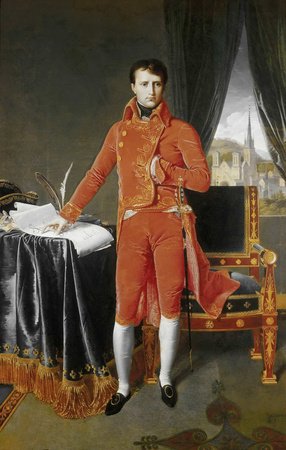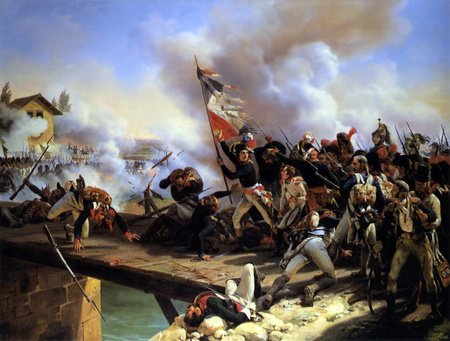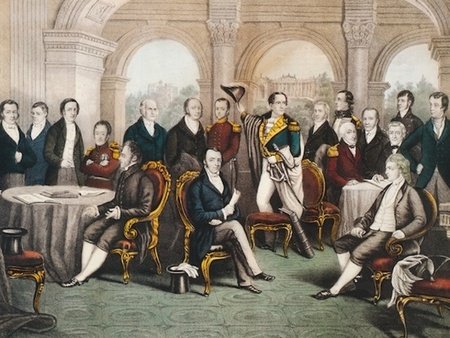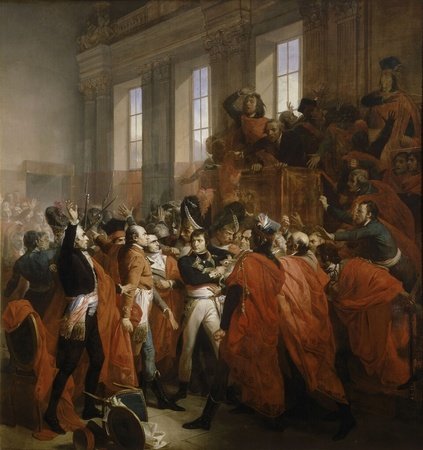
How Did Napoleon Rise to Power?
Blog by
First published: Monday February 12th, 2024
Report this blog
First published: Monday February 12th, 2024
Report this blog
+4
Quick Links
This blog shall provide an academic overview of the sequence of events in the French Revolution leading to Napoleon becoming ruler of France. It is chiefly intended for college students due to the intricate information provided and the high level of vocabulary.
For ease of learning, I have provided some hyperlinks to Encyclopedia Britannica or other relevant websites for certain specific terms or events not covered in detail in this article.

Napoleon as First Consul of France: the first role he held as sovereign of France
Overview
The short-term significance of the French Revolution could be ascribed to Napoleon Bonapate’s rise in power, leading France from 1799 to 1815 throughout its war period with Europe. Born in Ajaccio, Corsica, on 15th August 1769, he moved to mainland France and, in 1785, graduated from a military academy, becoming a second lieutenant in the artillery, commencing his career. Napoleon’s success as a military man in the Revolutionary Wars and political instability throughout the Revolution paved the path for his ascendancy as First Consul.
French Revolutionary Wars
His service in the ongoing French Revolutionary Wars granted him national acclaim and a providentially favourable reputation among citizens. In February 1792, Austria and Prussia signed a military alliance to pressure France into renouncing its constitutionalist and anti-clerical ideals. Seeking to assert its dominance and spread liberalism among conservative Europe, the National Constituent Assembly declared war on Austria on 20th April. The First Coaltion was formed – eventually growing to include Great Britain, Spain, Portugal, Piedmont-Sardinia and other Italian states – sparking the French Revolutionary Wars. In 1793, Napoleon was ordered to restore order in Toulon, which had revolted and was being bolstered by Great Britain. This was his first opportunity to exhibit his competence on the battlefield, which he executed victoriously – the British abandoned the city.
Three years later, the Italian Campaign against Austria – spearheaded by Napoleon – was successfully concluded. The subsequent Treaty of Campo Formio (1797) ceded many Austrian-controlled and Italian lands to France – such as Nice, Savoy and part of Venice – enhancing the general’s popularity. Soon after the War of the First Coalition concluded, Napoleon – commanding the Army of the Orient – invaded Egypt, attempting to seize the nation and Syria from the Ottoman Empire; however, progress halted in mid-1798, with the final defeat occurring in 1801. Nevertheless, the campaign generated positive publicity, giving Napoleon national fame as a hero.

'Napoleon Bonaparte leading his troops over the bridge of Arcole' during the Battle of Arcole: a decisive French victory in the Italian Campaign, contributing to Napoleon's national fame as a military idol
The Directory
Political turmoil and languidity under the Directory compelled citizens to desire a resolute government under one firm leader – Napoleon. On 22nd August 1795, the Constitution of Year III was approved, creating France’s first bicameral legislature: executive power lay in the hands of a five-member Directory, and that legislative was distributed between the upper chamber – the Council of Ancients – and the lower chamber – the Council of Five Hundred. The Constitution also admitted many powers to the Directory, such as curbing freedom of the press whilst dividing its authority enough to prevent a repeat of the overbearing Committee of Public Safety.
This made the legislative process inefficient, rendering the government impotent. Since many royalists and aristocrats were re-elected in the legislative elections of 1795 and 1797, corruption ran rampant, and remnants of the ‘Ancien Régime’, such as indirect taxation, were restored. The debased state of French politics during the Directory – seemingly a return to the prerevolutionary conservative order – was apparent. Worse yet, the economy was severely weak – inflation remained soaring since the Thermidorian Reaction, and bread became virtually unaffordable, leaving most of France impoverished. Combined with France’s limited success in the Revolutionary Wars, many wanted an efficacious administration to effect the liberal ideals promised a decade prior. The now-beloved general Napoleon was widely regarded as the optimal figure to lead France; this would be actuated in 1799.

The Directory: disapproved of by citizens due to its inefficiency and corruption, making them desire a stronger, more centralised government
Coup of 18 Brumaire
The Coup of 18 Brumaire sealed Napoleon’s rise to power, making him the effective dictator of France. Previously, he had quelled a royalist revolt attempting to overthrow the National Convention – 13 Vendémiaire. While in Egypt, Napoleon learned of in-fighting in the Directory between the two legislative chambers: the Council of Ancient and the Council of Five Hundred. Knowing that citizens would not protest the outcome, he returned to France in 1799, and on 9th November, he launched a coup d’état (the Coup of 18 Brumaire) to take over the Directory. The next day, the Consulate was established in place of the then government, with Napoleon as First Consul, marking the end of the French Revolution.
The Constitution of the Year VIII granted Napoleon dictatorial powers, leading him to become First Consul for Life in 1801, and in 1804, he crowned himself Emperor of France. Throughout his rule, he oversaw economic recovery by establishing the central Bank of France in 1800, recuperated state relations with the Roman Catholic Church with the issuing of the Concordat of 1801, reformed the legal system by chartering the Napoleonic Code (1804), overhauled the education system by instituting the University of France and restructuring primary and secondary schools, and most prominently, establishing the First French Empire dominating continental Europe, propagating nationalistic and liberal ideals and stimulating the creation of new nations.

Napoleon among the Council of Hundred during the Coup of 18 Brumaire: dissolving the Directory and leading to Napoleon becoming First Consul of France
Conclusion
The sequence of events during the French Revolution opportunely paved the path for Napoleon Bonaparte’s gradual rise in popularity and relevance. The Siege of Toulon, the Italian Campaign against Austria and the Egyptian Campaign of the Revolutionary Wars, along with the revolt of 13 Vendémiaire, earned him the status of a hero. Such eminence was instrumental in overthrowing the ineffective Directory in the Coup of 18 Brumaire, establishing him as First Consul of France and commencing his fifteen-year-long sovereignty – until the Hundred Days campaign of 1815.
Further Reading

This blog is part of a set concerning the FRENCH REVOLUTION. The rest can be accessed from my History series, listed consecutively as the first category of blogs.

(i know the entire thing about his height im jokin